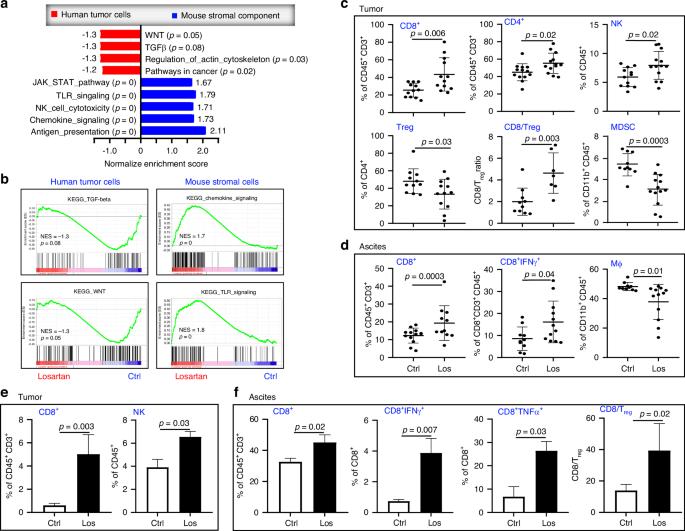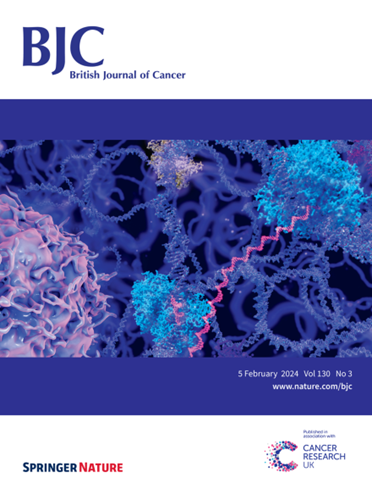洛沙坦能重塑肿瘤免疫微环境并抑制 IGF-1,从而克服卵巢癌化疗免疫疗法的耐药性。
IF 6.4
1区 医学
Q1 ONCOLOGY
引用次数: 0
摘要
背景:卵巢癌(OvCa)是最致命的妇科恶性肿瘤:卵巢癌(OvCa)是最致命的妇科恶性肿瘤。免疫检查点抑制剂彻底改变了多种恶性肿瘤的治疗,但对卵巢癌患者的疗效有限。造成疗效不佳的部分原因是卵巢肿瘤微环境(TME)异常,其细胞外基质呈现脱鳞和高度纤维化。细胞外基质的大量沉积会导致压迫力的积累,从而引起肿瘤血管塌陷、血管灌注减少、药物输送不畅以及细胞毒性 T 细胞向这些肿瘤的迁移受到影响:我们使用两种合成卵巢癌模型,测试了洛沙坦(一种广泛使用的抗高血压药物)对重塑TME和化疗致敏癌细胞的影响:结果:洛沙坦治疗(i)可重塑TME,导致血管灌注增加,从而增强药物输送和免疫效应细胞的瘤内浸润及功能;(ii)通过抑制IGF-1信号转导重构卵巢癌细胞,从而增强化疗敏感性。在肿瘤和基质的共同作用下,洛沙坦治疗增强了化疗免疫疗法在卵巢癌模型中的疗效:安全、低成本本文章由计算机程序翻译,如有差异,请以英文原文为准。

Losartan rewires the tumor-immune microenvironment and suppresses IGF-1 to overcome resistance to chemo-immunotherapy in ovarian cancer
Ovarian cancer (OvCa) is the most lethal of the gynecologic malignancies. Immune checkpoint inhibitors, which have revolutionized the treatment of multiple malignancies, have had limited efficacy in OvCa patients. This lack of effectiveness is partly due to the abnormal ovarian tumor microenvironment (TME), displaying a desmoplastic, highly fibrotic extracellular matrix. High extracellular matrix deposition leads to a buildup of compressive forces that cause tumor blood vessel collapse, reduced vessel perfusion, poor delivery of drugs, and compromised trafficking of cytotoxic T-cells to these tumors. Using two syngeneic OvCa models, we tested the effect of losartan, a widely prescribed anti-hypertensive drug, on reprogramming the TME and chemosensitizing the cancer cells. Losartan treatment (i) reprograms the TME leading to increased vascular perfusion, and thus enhances drug delivery and immune effector cell intratumoral infiltration and function; and (ii) rewires the OvCa cells by suppressing the IGF-1 signaling, resulting in enhanced chemosensitivity. As a result of the combined tumor and stromal effects, losartan treatment enhances the efficacy of chemo-immunotherapy in OvCa models. The safety and low cost ( < $1-2/day) of losartan warrant rapid translation of our findings to patients with OvCa.
求助全文
通过发布文献求助,成功后即可免费获取论文全文。
去求助
来源期刊

British Journal of Cancer
医学-肿瘤学
CiteScore
15.10
自引率
1.10%
发文量
383
审稿时长
6 months
期刊介绍:
The British Journal of Cancer is one of the most-cited general cancer journals, publishing significant advances in translational and clinical cancer research.It also publishes high-quality reviews and thought-provoking comment on all aspects of cancer prevention,diagnosis and treatment.
 求助内容:
求助内容: 应助结果提醒方式:
应助结果提醒方式:


